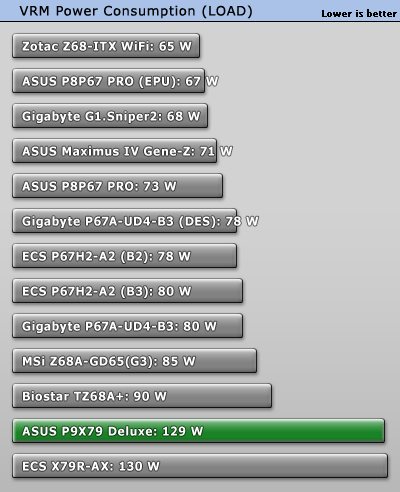 54
54
ASUS P9X79 Deluxe Intel LGA 2011 Review
CPU Performance Results »Test System
| Test System | |
|---|---|
| CPU: | Intel X3960 (ES) 3.3 GHz, 15 MB Cache |
| Memory: | 16 GB DDR3 (2x 4 GB) G.Skill F3-17000CL9Q-16GBZH |
| Cooling: | Noctua NH-C14 |
| Motherboard: | ASUS P9X79_Deluxe Intel X79 Express, BIOS ver 0802 |
| Video Card: | Sapphire Radeon HD 6950 2 GB |
| Harddisk: | Western Digital Caviar SE 16 WD5000AAKS 500GB SATA2 Seagate Barracuda LP ST2000DL003 2TB SATA 6 Gb/s iomega eGo BlackBelt 500GB USB3.0 |
| Power Supply: | Silverstone Strider GOLD 750W |
| Case: | Test Bench |
| Software: | Windows 7 64-bit, ATI Catalyst 11.11 |
Initial Setup
Setting up the ASUS P9X79 Deluxe proved an easy task, no different than any other motherboard, with the JEDEC 1600 MHz 11-11-11-31 1.5V profile of our G.Skill DIMMs booting right up without any issue. The OS install went perfectly, and no issues were noticed at any point during our testing period, even when overclocking.
PWM Power Consumption
Since one of our first tasks was to truly verify system stability, while doing so we measure CPU power consumption. We isolate the power coming through the 8-pin ATX connector using an in-line meter that provides voltage and current readings, as well as total wattage passed through it. While this may not prove to isolate the CPU power draw in all instances, it does serve as a good indicator of board efficiency and effective VRM design.

The ASUS P9X79 Deluxe put up some pretty impressive numbers on 8-pin power consumption. First, in idle mode, a draw of just three watts was noticed, a full 15 watts lower than the last Intel X79 Express product we tested. At load, the situation was a bit different, however, with 129 watts drawn via the 8-pin EPS connector, just one watt less than the ECS X79R-AX.
Apr 26th, 2024 13:20 EDT
change timezone
Latest GPU Drivers
New Forum Posts
- The Official Linux/Unix Desktop Screenshots Megathread (702)
- What's your latest tech purchase? (20352)
- hacked (73)
- im new to throttelstop and i think i messed it up by copying others any hints would be very much aprreciated (5)
- 2022-X58/1366 PIN Motherboards NVME M.2 SSD BIOS MOD Collection (657)
- DTS DCH Driver for Realtek HDA [DTS:X APO4 + DTS Interactive] (1909)
- checkup (1)
- Help me to OC my 5700X (10)
- XFX RX470 8GB no video and error 43 (28)
- The TPU UK Clubhouse (24788)
Popular Reviews
- HYTE THICC Q60 240 mm AIO Review
- MOONDROP x Crinacle DUSK In-Ear Monitors Review - The Last 5%
- Alienware Pro Wireless Gaming Keyboard Review
- Upcoming Hardware Launches 2023 (Updated Feb 2024)
- Thermalright Phantom Spirit 120 EVO Review
- FiiO K19 Desktop DAC/Headphone Amplifier Review
- ASUS Radeon RX 7900 GRE TUF OC Review
- RTX 4090 & 53 Games: Ryzen 7 5800X vs Ryzen 7 5800X3D Review
- NVIDIA RTX 4090: 450 W vs 600 W 12VHPWR - Is there any notable performance difference?
- AMD Ryzen 7 7800X3D Review - The Best Gaming CPU
Controversial News Posts
- Windows 11 Now Officially Adware as Microsoft Embeds Ads in the Start Menu (128)
- Sony PlayStation 5 Pro Specifications Confirmed, Console Arrives Before Holidays (117)
- NVIDIA Points Intel Raptor Lake CPU Users to Get Help from Intel Amid System Instability Issues (106)
- AMD "Strix Halo" Zen 5 Mobile Processor Pictured: Chiplet-based, Uses 256-bit LPDDR5X (102)
- US Government Wants Nuclear Plants to Offload AI Data Center Expansion (98)
- AMD's RDNA 4 GPUs Could Stick with 18 Gbps GDDR6 Memory (92)
- Developers of Outpost Infinity Siege Recommend Underclocking i9-13900K and i9-14900K for Stability on Machines with RTX 4090 (85)
- Windows 10 Security Updates to Cost $61 After 2025, $427 by 2028 (84)

